

In, but not Of, the Market: The Special Challenge of Nonprofit-ness - NPQ - Nonprofit Quarterly. PhotoGraphyca / Shutterstock.com Editors’ Note: As the articles in this issue of the Nonprofit Quarterly demonstrate, nonprofits cannot escape the need for careful financial management faced by other types of institutions.
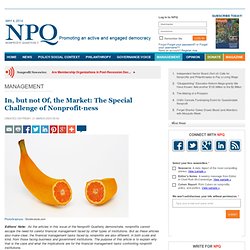
But as these articles also make clear, the financial management tasks faced by nonprofits are also different, in both scale and kind, from those facing business and government institutions. The purpose of this article is to explain why that is the case and what the implications are for the financial management tasks confronting nonprofit institutions. At the heart of the dilemma that underlies all nonprofit management is the fact that American nonprofit institutions operate in the context of a market economy, yet they are not fundamentally market institutions. Www.bond.org.uk/data/files/publications/The_Small_Majority_-_Clore_report_on_small_NGOs.pdf. 10 myths about working in the nonprofit sector. The nonprofit sector is more dynamic than most people think.

Explore these myths and see the sector in a new way. Myth #1. “Only rich kids need apply.” NGOs working with Government. 28/06/2010 at 1:29 pm The global “aid effectiveness” debate has thrown new light on the role of NGOs and other civil society organisations in development cooperation.
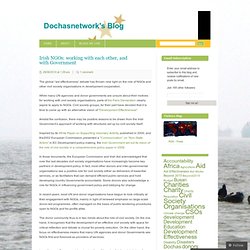
While many UN agencies and donor governments are unsure about their motives for working with civil society organisations, parts of the Paris Declaration clearly aspire to apply to NGOs. Civil society groups, for their part have decided that it is time to come up with an alternative vision of “Development Effectiveness“. Amidst the confusion, there may be positive lessons to be drawn from the Irish Government’s approach of working with structures set up by civil society itself. Inspired by its White Paper on Supporting Voluntary Activity, published in 2000, and the2002 European Commission presented a “Communication” on “Non-State Actors” in EC Development policy-making, the Irish Government set out its vision of the role of civil society in a comprehensive policy paper in 2008. Irish Aid Civil Society Policy. Aid to government, aid to NGOs – both working in different ways. The UK Department for International Development is to be commended for encouraging some of its staff to maintain a blog to explain to the public what they do.
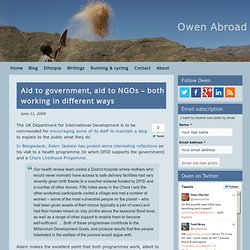
In Bangladesh, Adam Jackson has posted some interesting reflections on his visit to a health programme (in which DFID supports the government) and a Chars Livelihood Progamme. Our health review team visited a District hospital where mothers who would never normally have access to safe delivery facilities had very recently given birth thanks to a voucher scheme funded by DFID and a number of other donors.
Adam makes the excellent point that both programmes work, albeit to achieve different kinds of objectives. Working through Government may be slower and more uncertain, but in the long run it is an investment in Government systems which, in the end, Bangladesh will need as it becomes more prosperous and no long relies on foreign aid. Adam’s call for rigorous, transparent evaluation is welcome. EU on working w Civil Society.
EU Commission on working w Civil Society. Civil-society-dialogue-between-the-eu-and-candidate-countries. ILO on EU and Civil Society. Government-CSO collaborations. Charities, NGOs, Active Citizenship and the Government. DCU on civil society engagement (2007) How OECD members work with NGOs. World Bank Working with NGOs. NGOs: mobilising people. NGO mergers – Make sense, don’t they? 03/09/2011 at 11:26 am Earlier this week, the Irish Independent published a letter praising the high quality of the work of Irish NGOs responding to emergencies around the world, and stating that if those same agencies were to amalgamate they would save money and “have more clout and authority”.

We have talked about this issue before, and we’ll do it again: For aid agencies, their clout and authority does not come from size, but from the strength of their bond with the people they are trying to help. No one NGO, however big, can hope to support all of the world’s poor people and communities. In contrast, a diverse range of NGOs, each working according to their own strengths, yet united through coordinating mechanisms and peer networks such as Dóchas, can respond nimbly, flexibly and effectively to the many different facets of “poverty”. Funding shift weakens resistance to mergers. NGOs working together for greater impact. Andrea Pappin: There are 24,000 charities in Ireland ... do we really need that many? - Comment, Opinion. Updated 01 December 2012 06:14 PM This is a conversation that we don’t seem to be happy to even broach in this country.
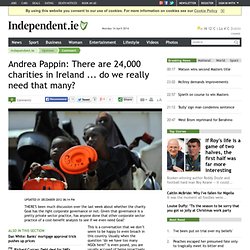
Usually when the question ‘do we have too many NGOs here?’ Is even posed, you are usually accused of being proactively in favour of both seal-clubbing and children home and abroad catching preventable diseases. So before anyone hits the keyboard to reply with indigence, let’s start with some basics so you can see where this is coming from. Searching for a cure for cancer and other fatal diseases, the protection of the seriously vulnerable in Ireland and abroad and many, many causes in between are all areas that need representation. Retirement, replacement or rejuvenation? / Special Report: The future calling / Special Reports - The Broker.
The NGO community agrees that the foreign aid frame is no longer a viable option, even if that means that NGOs have to evolve into something else.
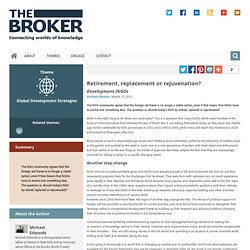
The question is, should today’s NGO by retired, replaced or rejuvenated? What is the right thing to do when you reach sixty? This is a question that many NGOs, which were founded in the burst of internationalism that followed the end of World War II, are asking themselves today as they reach late middle age.
Scaling Up NGO Impact. Future Calling. » N van NGO: de slotbalans. Nu de discussie over de toekomst van het maatschappelijk middenveld ‘N van NGO’ op zijn einde loopt mag de staatssecretaris zijn conclusies gaan trekken en antwoord geven op de vraag: Heeft de discussie zijn doel gediend?

Strategies NGOs: Four Generations.